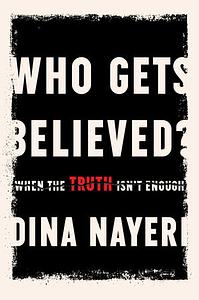Take a photo of a barcode or cover
tense
It has some interesting aspects but dang the author has seriously problematic views about mental health and a total lack of empathy regarding suicide as well as sickle cell pain. I finished it, but numerous times I just wanted to throw the audiobook and tell her to shut up. The author seems like a totally unlikeable person….i don’t care how many degrees she has.
Thanks to NetGalley and Dreamscape Media for the audio ARC. It hasn't affected the content of my review.
This is a book that many, many people right now could benefit from reading and thinking very hard about, and then reflecting extra super hard about their life choices. (I am not excluded from this!)
I clicked "Request" on NetGalley for this one on an impulse, and I'm glad I did. The topic seemed interesting and relevant, and that turned out to very much be the case. I'm always curious about books like this that cover such broad topics, how they could possibly claim to cover all the available avenues of inquiry, and if they don't, how they choose to limit and structure their books. For Who Gets Believed? the author—a refugee from Iran who fled the country with her mother when she was eight because her mother was a Christian, and then became a refugee in middle America—the answer is that she weaves her personal narrative throughout, and covers topics that relate to things that she has experienced. Because her experience is much broader than the average citizen, she ends up covering a variety of subject matter, including the process of applying for asylum (mostly in the US and the UK), patient doctor interactions (with emphasis on drug-seeking behavior and women's healthcare), mental illness, family dynamics, and religious belief.
I would say Who Gets Believed? is about 50% memoir and what isn't memoir is influenced by it. This is a personal book, not an objective piece of journalism or academia. That said, it's obvious (especially given the subject matter) that credibility is important to the author for multiple reasons, so the non-fictional elements are always well supported with evidence, and when facts are unsure, that's always noted.
The reason I say that everyone should read this is because it is Nayeri's main point that we as humans, especially in the age of information technology where it is so easy to be fooled or taken in by false narratives, naturally rely too often on our own instincts, our heuristics, rather than on the more rational parts of our brain. There's a reason we have the ability to do both, think rationally and separately, and to take mental shortcuts. The two processes shore up each other's weaknesses. And when that balance is off, you get instances like the following: A young woman with the BCRA gene repeatedly asks a nurse to test her for breast cancer when having breast pain, and is refused and her concerns dismissed as anxiety, only to find out almost too late that she has one of the most aggressive forms of breast cancer, and she almost dies. That's some scary shit, and it should be paid attention to.
[4.5 stars]
This is a book that many, many people right now could benefit from reading and thinking very hard about, and then reflecting extra super hard about their life choices. (I am not excluded from this!)
I clicked "Request" on NetGalley for this one on an impulse, and I'm glad I did. The topic seemed interesting and relevant, and that turned out to very much be the case. I'm always curious about books like this that cover such broad topics, how they could possibly claim to cover all the available avenues of inquiry, and if they don't, how they choose to limit and structure their books. For Who Gets Believed? the author—a refugee from Iran who fled the country with her mother when she was eight because her mother was a Christian, and then became a refugee in middle America—the answer is that she weaves her personal narrative throughout, and covers topics that relate to things that she has experienced. Because her experience is much broader than the average citizen, she ends up covering a variety of subject matter, including the process of applying for asylum (mostly in the US and the UK), patient doctor interactions (with emphasis on drug-seeking behavior and women's healthcare), mental illness, family dynamics, and religious belief.
I would say Who Gets Believed? is about 50% memoir and what isn't memoir is influenced by it. This is a personal book, not an objective piece of journalism or academia. That said, it's obvious (especially given the subject matter) that credibility is important to the author for multiple reasons, so the non-fictional elements are always well supported with evidence, and when facts are unsure, that's always noted.
The reason I say that everyone should read this is because it is Nayeri's main point that we as humans, especially in the age of information technology where it is so easy to be fooled or taken in by false narratives, naturally rely too often on our own instincts, our heuristics, rather than on the more rational parts of our brain. There's a reason we have the ability to do both, think rationally and separately, and to take mental shortcuts. The two processes shore up each other's weaknesses. And when that balance is off, you get instances like the following: A young woman with the BCRA gene repeatedly asks a nurse to test her for breast cancer when having breast pain, and is refused and her concerns dismissed as anxiety, only to find out almost too late that she has one of the most aggressive forms of breast cancer, and she almost dies. That's some scary shit, and it should be paid attention to.
[4.5 stars]
Nayeri's analysis of the creation of belief in the specific context of immigration law takes many detours into other fields and her personal background, including extensive examinations of glossolalia (speaking in tongues). While parts of the book are painful to read, the storytelling is engaging. Nayeri isn't afraid to paint herself as a difficult woman or to examine a tragic family incident in which she bears blame.
I expected a more straightforward narrative structure but a reference by the author to Iranian immigrants answering yes or no questions with stories in a way that isn't well understood by immigration authorities made me think that this might be cultural, and surrendering to the path through the book was ultimately satisfying.
I expected a more straightforward narrative structure but a reference by the author to Iranian immigrants answering yes or no questions with stories in a way that isn't well understood by immigration authorities made me think that this might be cultural, and surrendering to the path through the book was ultimately satisfying.
hopeful
informative
reflective
sad
medium-paced
Nayeri's book was not what I expected. Based on the blurb, I was expecting primarily a discussion of how immigration authorities do not believe certain groups of people's experiences due to bias and the like.
This book includes a significant portion of that, but it has a lot more as well. It really is a work of practical epistemology--how can we have knowledge (justified true belief) in various contexts and how does it draw from that.
Nayeri does not seem like an expert in epistemology. Rather, it seems like she began exploring these philosophical themes in response to particular epistemic challenges she came across, including questions related to believing refugees, what counts as evidence, how authority figure are predisposed to believe those like themselves, religious belief, changes in scientific approaches (fire science, for instance), medical contexts (her own pregnancy/refugees), and personal stories about her partner's younger brother and his mental health.
I found the refugee parts powerful and that's where Nayeri seemed at her strongest. It took me a while to figure out what she was doing when talking about her partner's younger brother. It was her showing, in my opinion, that she, like everyone, has blind spots that affect her ability to see rightly. Despite seeing what she was doing, it was deeply uncomfortable when she would talk about that.
I found her descriptions of her religious experience and the stories of refugees to be some of the most compelling parts of her story.
This book includes a significant portion of that, but it has a lot more as well. It really is a work of practical epistemology--how can we have knowledge (justified true belief) in various contexts and how does it draw from that.
Nayeri does not seem like an expert in epistemology. Rather, it seems like she began exploring these philosophical themes in response to particular epistemic challenges she came across, including questions related to believing refugees, what counts as evidence, how authority figure are predisposed to believe those like themselves, religious belief, changes in scientific approaches (fire science, for instance), medical contexts (her own pregnancy/refugees), and personal stories about her partner's younger brother and his mental health.
I found the refugee parts powerful and that's where Nayeri seemed at her strongest. It took me a while to figure out what she was doing when talking about her partner's younger brother. It was her showing, in my opinion, that she, like everyone, has blind spots that affect her ability to see rightly. Despite seeing what she was doing, it was deeply uncomfortable when she would talk about that.
I found her descriptions of her religious experience and the stories of refugees to be some of the most compelling parts of her story.
emotional
informative
reflective
medium-paced
In this book the author explores the idea of who to believe. Whether it is refugees trying to be accepted as legitimate refugees or poor people in prison, to are people who claim to be speaking in tongues really legit, and when do we believe people who threaten suicide and those who are really sick and need pain meds or not.
She weaves these thoughts with her own research as well as talking to people who are trying to convince judges, immigration officers and doctors that they are telling the truth. Although my own personal research has found conflicts with her conclusion on speaking in tongues- I do believe that this is a very important book.
She weaves these thoughts with her own research as well as talking to people who are trying to convince judges, immigration officers and doctors that they are telling the truth. Although my own personal research has found conflicts with her conclusion on speaking in tongues- I do believe that this is a very important book.
I loved this book so much at first but when it began to discuss her brother in law and his subsequent suicide I had to stop reading. Not even in a way where it was triggering, I just couldn't stand the way it was discussed.
I will maybe try to finish this eventually because the stories are important and interesting, I just couldn't be bothered with the continued language and implications around mental health.
I will maybe try to finish this eventually because the stories are important and interesting, I just couldn't be bothered with the continued language and implications around mental health.
This is part memoir and part personal insight into who gets believed - in the courtroom, in the ER, in the immigration office. It's deeply personal and the stories told of other people's fates are shocking and horrifying. Truth in itself seems to be of little consequences, how it's said is often the essential point. The cultural differences and the differences that occur simply through passing time also play an important role.





